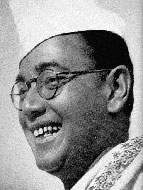
There were many great heroes born at the time of the freedom movement. Each with his own method of attaining one goal - Independence for India. Some believed in non-violent means, whereas others did not. One such hero was Subhash Chandra Bose, popularly known as 'Netaji'.
Netaji's Background
Born on January 23, 1897 in Cuttack, Orissa, to a successful lawyer Jankinath Bose and his wife Prabhavati, Netaji was of a unique temperament. His father was also chairman of the Municipal Committee and encouraged education in his province. His mother was a follower of Swami Ramakrishna Paramhansa and so inculcated spiritual values in her son. Netaji was also influenced by Swami Vivekananda.
To please his father, Netaji went to England to appear for the Indian Civil Service (I.C.S.) Examination, and achieved fourth place on the Merit list. But he had no intention of serving the British. Instead he wanted to participate in the Nationalist Movement and liberate his Motherland.
Birth of a Revolutionary
Netaji was influenced more by Lokmanya Tilak and Sri Aurobindo. He did not agree with Gandhiji's methods of achieving Independence through non-violence. Rana Pratap and Shivaji were Netaji's heroes and he believed that the only way to liberate his people was by shedding blood.
At first, Netaji joined the Congress Party and was even elected President. But because he did not agree with their views, he broke off to form the Forward Bloc. He was imprisoned for his revolutionary activities on various occasions.
Meeting with Hitler
At the time of World War II, the British were in a tight spot due to the pressure from Hitler. Netaji was under detention in Calcutta at that time, and decided to take advantage of the situation. Dressed as a Pathan, he escaped to Peshawar and then moved on to Kabul and Moscow. Next was Germany. Here he approached Hitler with his cause. Hitler was impressed and promised to help him. He then organized all the Indian Prisoners of War to form the Liberation Army and the Free Indian Army.
The Indian National Army (I.N.A.)
In 1941, Netaji went to Japan and formed the I.N.A. in 1943. 1945 witnessed the I.N.A. waging a war from the North - West of our country. He inspired his army with the battle cry 'Delhi Chalo'. Even though he did not succeed in this battle, he had driven home his message. The Britishers realised that the Indians were serious about gaining independence, and would assume any means towards that end.
On August 17, 1945, Bose died in a plane crash while flying from Bangkok to Tokyo. He did not live to see the Indian Independence, but his spirit still lives through his words - JAI HIND.
No comments:
Post a Comment